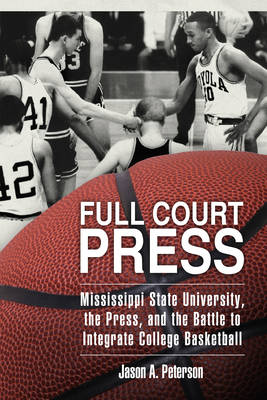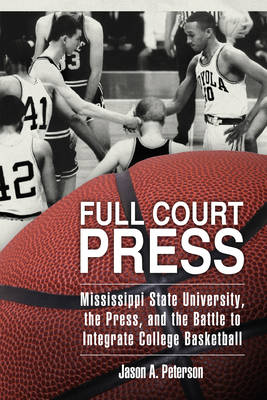
- Retrait gratuit dans votre magasin Club
- 7.000.000 titres dans notre catalogue
- Payer en toute sécurité
- Toujours un magasin près de chez vous
- Retrait gratuit dans votre magasin Club
- 7.000.0000 titres dans notre catalogue
- Payer en toute sécurité
- Toujours un magasin près de chez vous
Full Court Press
Mississippi State University, the Press, and the Battle to Integrate College Basketball
Jason A Peterson
186,95 €
+ 373 points
Format
Description
"The celebrity phenomena of, say, LeBron James and Stephen Curry owe their possibility to a roster of names few outside of the state of Mississippi have ever heard: Coolidge Ball, Wilbert Jordan Jr., Larry Fry, and Jerry Jenkins. These barrier breakers integrated the hardwoods of the Magnolia State against the entrenched and well-funded wishes of the state's power elites. It's a little-known story. Fortunately, Jason A. Peterson decided to tell it and to ground that story in the archives of Mississippi's many daily and weekly newspapers. The result is an important chronicle compellingly told. African American history, which is to say American history, is better off for it." -Brian Carroll, author of The Black Press and Black Baseball, 1915-1955: A Devil's Bargain and When to Stop the Cheering? The Black Press, the Black Community, and the Integration of Professional Baseball "This well-researched investigation is a welcome contribution to the ever-expanding body of scholarship documenting Mississippi's long struggle for civil rights. Studies examining the Magnolia State's closed society ethos have rarely employed popular culture as a tool for unlocking meaning in the state's long and complex struggle over black freedom. The book clearly displays that the saliency of both popular sports and the newsprint media covering them deserve equal recognition next to the state's voting booths, picket lines, and lunch counters as sights for contested meaning in Mississippi's battle over integration. With insightful analysis and carefully crafted argument, Jason Peterson reminds us that sports and their media culture have long been a window through which both Mississippi and the nation perceive their ideas about race and inclusion." -Kevin D. Greene, co-director of the Center for Oral History and Cultural Heritage at the University of Southern Mississippi Jason A. Peterson is assistant professor of communication at Charleston Southern University. A former journalist and public relations practitioner, Peterson's work has been published in American Journalism: A Journal of Media History and in the book From Jack Johnson to LeBron James: Sports, Media, and the Color Line.
Spécifications
Parties prenantes
- Auteur(s) :
- Editeur:
Contenu
- Nombre de pages :
- 270
- Langue:
- Anglais
- Collection :
Caractéristiques
- EAN:
- 9781496808202
- Date de parution :
- 01-09-16
- Format:
- Livre relié
- Format numérique:
- Genaaid
- Dimensions :
- 156 mm x 234 mm
- Poids :
- 594 g

Les avis
Nous publions uniquement les avis qui respectent les conditions requises. Consultez nos conditions pour les avis.






